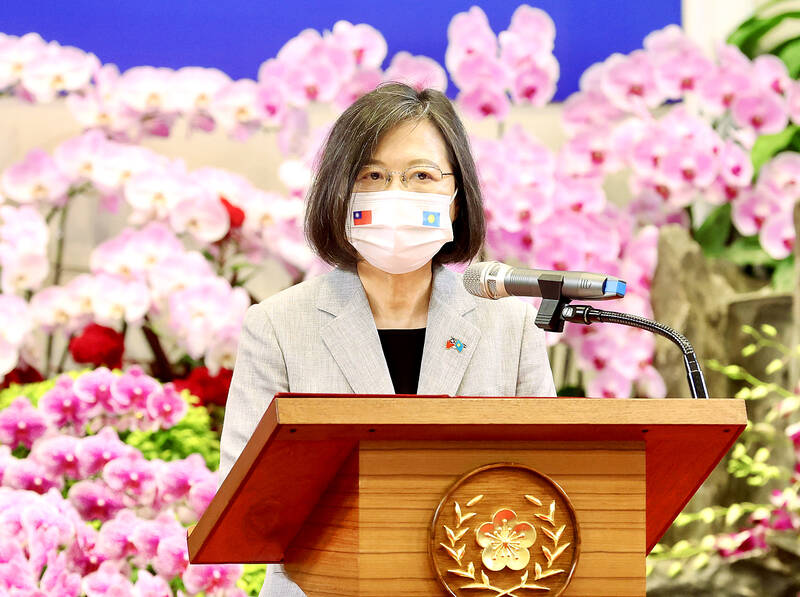Taiwan will not rely on others for its defense, President Tsai Ing-wen (蔡英文) said on Wednesday, while welcoming a US commitment to the nation’s security during what she called Chinese encroachment on its sovereignty.
Tsai’s remarks, pre-recorded and delivered to a US audience at a Washington forum, came after US President Joe Biden last month pledged to defend Taiwan in the event of any “unprecedented attack” by China.
In her address to the Washington-based Global Taiwan Institute think tank, Tsai thanked the Biden administration and the US Congress for upholding the US commitment to Taiwan’s security and for recent US military arms sales.

Photo: CNA
“But we will not depend on others to come to our own defense,” Tsai said.
“That is why I want to reiterate that Taiwan is fully committed to protecting our security and maintaining our democratic way of life. We’re also working to adapt our defense strategy to the changing threats we face,” she said.
Although the White House has said Biden’s pledge did not signify a change in US policy, critics said he might have undercut — intentionally or not — a US stance of not taking a position on Taiwan’s independence.
China mounted large-scale military drills after an August visit to Taipei by US House of Representatives Speaker Nancy Pelosi.
Chinese military activities have continued since then, although at a much reduced level. Chinese military aircraft have continued routinely crossing the median line of the Taiwan Strait, which had for years acted as an unofficial barrier.
Taiwan on Wednesday said that eight Chinese fighters flew across the median line.
Tsai said those operations “encroach on Taiwan’s sovereignty and threaten peace and stability in the Indo-Pacific region.”
“We know from history and current events that threats against any one country or region translate directly and indirectly to increasing threats against its neighbors,” she said.
American Institute in Taiwan Chairman James Moriarty said “strategic ambiguity” over whether Washington would come to Taiwan’s defense had never been stated as policy in any documents.
“It’s never been a policy. It’s been a description of what we do,” Moriarty told the forum.
Referring to the US’ decades-old Taiwan Relations Act, which forms the basis of the US’ unofficial ties with Taiwan, he said: “The original documents make it clear that we would have to do something if there is an attempt to change Taiwan’s status by force.”
Moriarty added that he did not think Chinese President Xi Jinping (習近平) had set a deadline of 2027 to take Taiwan, only that China’s military should have the capability to do so by then.
“We have no idea what impact a slowing economy has on his thinking. We have no idea what impact the Russian failures in Ukraine have on his thinking... So is there a firm deadline? I don’t think so,” he said.

A Ministry of Foreign Affairs official yesterday said that a delegation that visited China for an APEC meeting did not receive any kind of treatment that downgraded Taiwan’s sovereignty. Department of International Organizations Director-General Jonathan Sun (孫儉元) said that he and a group of ministry officials visited Shenzhen, China, to attend the APEC Informal Senior Officials’ Meeting last month. The trip went “smoothly and safely” for all Taiwanese delegates, as the Chinese side arranged the trip in accordance with long-standing practices, Sun said at the ministry’s weekly briefing. The Taiwanese group did not encounter any political suppression, he said. Sun made the remarks when

PREPAREDNESS: Given the difficulty of importing ammunition during wartime, the Ministry of National Defense said it would prioritize ‘coproduction’ partnerships A newly formed unit of the Marine Corps tasked with land-based security operations has recently replaced its aging, domestically produced rifles with more advanced, US-made M4A1 rifles, a source said yesterday. The unnamed source familiar with the matter said the First Security Battalion of the Marine Corps’ Air Defense and Base Guard Group has replaced its older T65K2 rifles, which have been in service since the late 1980s, with the newly received M4A1s. The source did not say exactly when the upgrade took place or how many M4A1s were issued to the battalion. The confirmation came after Chinese-language media reported

The Taiwanese passport ranked 33rd in a global listing of passports by convenience this month, rising three places from last month’s ranking, but matching its position in January last year. The Henley Passport Index, an international ranking of passports by the number of designations its holder can travel to without a visa, showed that the Taiwan passport enables holders to travel to 139 countries and territories without a visa. Singapore’s passport was ranked the most powerful with visa-free access to 192 destinations out of 227, according to the index published on Tuesday by UK-based migration investment consultancy firm Henley and Partners. Japan’s and

BROAD AGREEMENT: The two are nearing a trade deal to reduce Taiwan’s tariff to 15% and a commitment for TSMC to build five more fabs, a ‘New York Times’ report said Taiwan and the US have reached a broad consensus on a trade deal, the Executive Yuan’s Office of Trade Negotiations said yesterday, after a report said that Washington is set to reduce Taiwan’s tariff rate to 15 percent. The New York Times on Monday reported that the two nations are nearing a trade deal to reduce Taiwan’s tariff rate to 15 percent and commit Taiwan Semiconductor Manufacturing Co (TSMC, 台積電) to building at least five more facilities in the US. “The agreement, which has been under negotiation for months, is being legally scrubbed and could be announced this month,” the paper said,